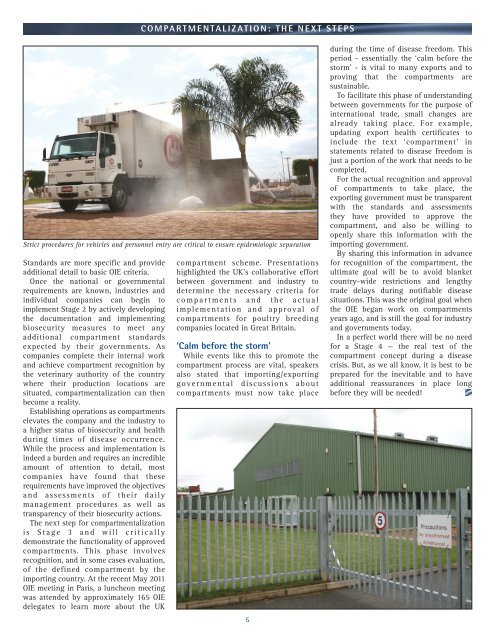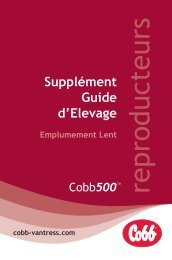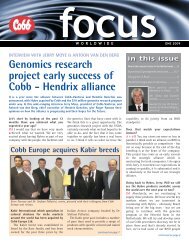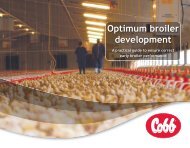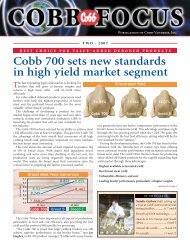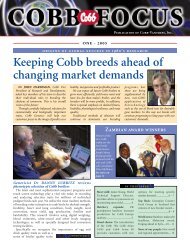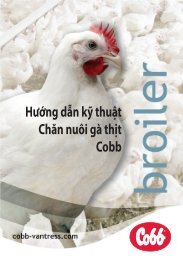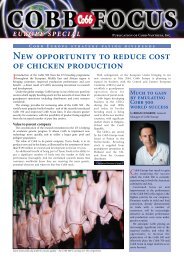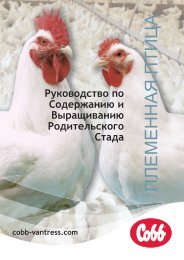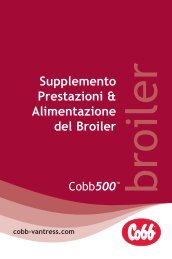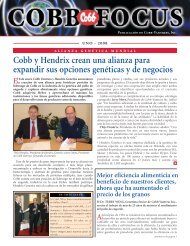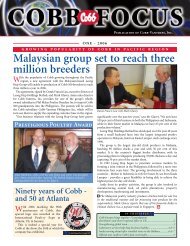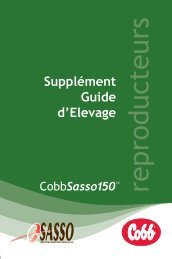Cobb Focus Three 2011 (English)
Cobb Focus Three 2011 (English)
Cobb Focus Three 2011 (English)
Create successful ePaper yourself
Turn your PDF publications into a flip-book with our unique Google optimized e-Paper software.
C O M P A R T M E N T A L I Z A T I O N : T H E N E X T S T E P SStrict procedures for vehicles and personnel entry are critical to ensure epidemiologic separationStandards are more specific and provideadditional detail to basic OIE criteria.Once the national or governmentalrequirements are known, industries andindividual companies can begin toimplement Stage 2 by actively developingthe documentation and implementingbiosecurity measures to meet anyadditional compartment standardsexpected by their governments. Ascompanies complete their internal workand achieve compartment recognition bythe veterinary authority of the countrywhere their production locations aresituated, compartmentalization can thenbecome a reality.Establishing operations as compartmentselevates the company and the industry toa higher status of biosecurity and healthduring times of disease occurrence.While the process and implementation isindeed a burden and requires an incredibleamount of attention to detail, mostcompanies have found that theserequirements have improved the objectivesand assessments of their dailymanagement procedures as well astransparency of their biosecurity actions.The next step for compartmentalizationi s S t a g e 3 a n d w i l l c r i t i c a l l ydemonstrate the functionality of approvedcompartments. This phase involvesrecognition, and in some cases evaluation,of the defined compartment by theimporting country. At the recent May <strong>2011</strong>OIE meeting in Paris, a luncheon meetingwas attended by approximately 165 OIEdelegates to learn more about the UKcompartment scheme. Presentationshighlighted the UK’s collaborative effortbetween government and industry todetermine the necessary criteria forc o m p a r t m e n t s a n d t h e a c t u a limplementation and approval ofcompartments for poultry breedingcompanies located in Great Britain.‘Calm before the storm’While events like this to promote thecompartment process are vital, speakersalso stated that importing/exportinggovernmental discussions aboutcompartments must now take place5during the time of disease freedom. Thisperiod - essentially the ‘calm before thestorm’ - is vital to many exports and toproving that the compartments aresustainable.To facilitate this phase of understandingbetween governments for the purpose ofinternational trade, small changes arealready taking place. For example,updating export health certificates toinclude the text ‘compartment’ instatements related to disease freedom isjust a portion of the work that needs to becompleted.For the actual recognition and approvalof compartments to take place, theexporting government must be transparentwith the standards and assessmentsthey have provided to approve thecompartment, and also be willing toopenly share this information with theimporting government.By sharing this information in advancefor recognition of the compartment, theultimate goal will be to avoid blanketcountry-wide restrictions and lengthytrade delays during notifiable diseasesituations. This was the original goal whenthe OIE began work on compartmentsyears ago, and is still the goal for industryand governments today.In a perfect world there will be no needfor a Stage 4 — the real test of thecompartment concept during a diseasecrisis. But, as we all know, it is best to beprepared for the inevitable and to haveadditional reassurances in place longbefore they will be needed!


